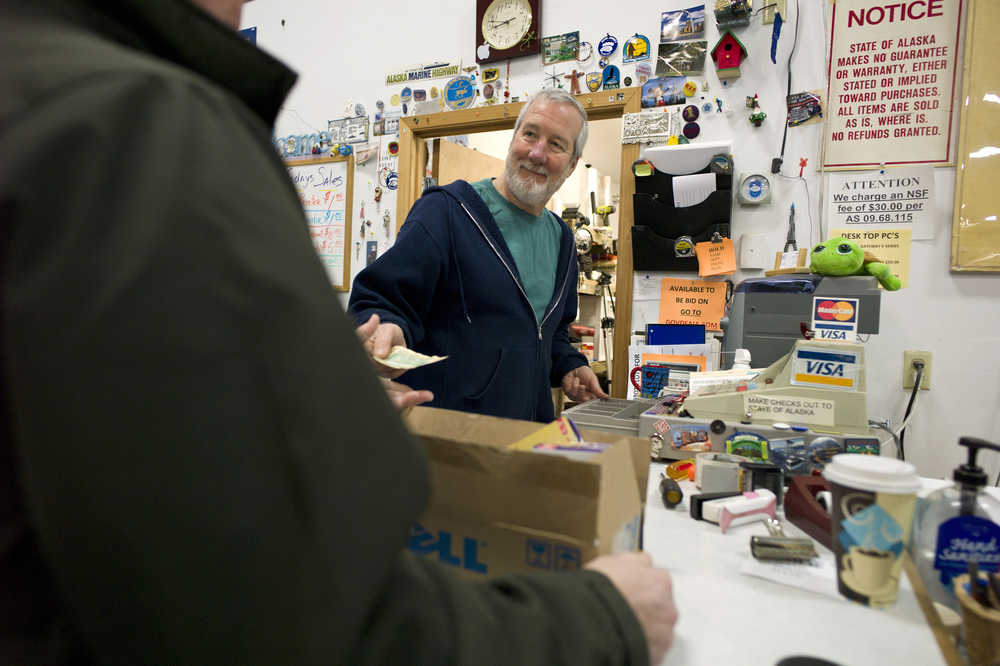A Juneau institution is ending: The state surplus barn will close at the end of June.
“Yeah, this is going to be sad,” said John Shakespeare, one of about 30 people who gathered Wednesday morning for one of the barn’s last sales. The state is replacing the barn with a new online auction system.
For decades, going back to when the barn was downtown (it’s now in Lemon Creek), its weekly Wednesday sales have attracted college students and penny-pinching retirees alike.
“It’s just a little cult thing,” said Ron Klein, a regular shopper.
They peruse racks of discarded flat-panel computer monitors ($5 each), boxes of black-handled scissors, obscure electronic equipment, old typewriters, dented desks and assorted chairs.
“There’s good deals, and there’s deals that aren’t so good,” Klein said, referring to a time he bought an expensive device that turned out to be broken.
On Wednesday, he taped joking signs reading “Save Our Surplus” to shelves throughout the warehouse. The signs were printed on a machine bought from surplus, and “I even bought my tape from surplus,” he said, holding up a well-used dispenser.
He said he doesn’t feel there’s much hope of averting the closure, and the signs were mostly a joke.
“You know when you’re moving out of a house and can hear the echo once you’ve moved out your furniture? You can hear it in here,” he said. “Just listen.”
The weekly group of shoppers includes those who get their news from public radio and those who get their news from AM radio. It includes men and women, retired and still-employed. Every Wednesday morning, they gather in the warehouse to swap stories and await its 8:30 a.m. opening.
“All the guys get together,” Shakespeare said. “This is our Wednesday.”
They get coffee, sit, talk, then comb through stacks of metal shelves for treasures discarded by state agencies.
“I buy my office equipment here,” said Dave Hanna, who runs a concrete business.
He says his office is full of concrete dust that takes a toll on electronics. It doesn’t make sense to buy new, so he’s bought used copiers and other equipment from the surplus barn.
“I think this is going to be an abysmal failure,” Hanna said of the barn’s closure.
Shakespeare agreed. “I don’t see why the state would cut this, because this makes money,” he said.
Tom Mayer, director of the Division of General Services within the Alaska Department of Administration, is in charge of the surplus operation and said that isn’t quite true. The lease on the Lemon Creek warehouse (there’s also one in Anchorage) is $80,000 per year, and as state agencies have seen their budgets cut, less material is being deemed surplus.
“Because their budgets are smaller, they’re not buying as much stuff,” he said.
The surplus barn is supposed to fund itself, but with less sales volume, that’s becoming more difficult, he said. The Anchorage surplus warehouse is also closing, for the same reasons.
Both will be replaced by an online sales system. The current barn employees will stay on the job, processing items deemed surplus by state agencies. They’ll work with property officers within those agencies to put the items online.
Looking around the warehouse on Wednesday morning, he waved his hand and said that while there might have been 50 or so shoppers in there, there are more than 30,000 people in Juneau, and hundreds of thousands across Alaska.
Putting surplus sales online (the state already sells some of its surplus items online) makes them available to a wider audience, and other states have already taken similar steps.
“It’s the right move for the state,” Mayer said. “Our goal is cheaper, better, faster.”
While the “cult” of surplus might be disappointed, “we shouldn’t be here just to be nice to certain groups,” he said.
While Wednesday’s typical morning crowd is usually bearded, men aren’t the only people who shop at the barn. Noelle Derse shopped with her daughter, 2-year-old Esme, who was attracted by a pair of whistles that she proceeded to test.
“I’ve been coming here 15 years, every week, with all my kids,” Derse said. “I think it’s the best way to recycle.”
She said she’s furnished her home with state-surplus items and continues to find useful items.
“All this stuff is great,” she said.
Asked if she favors the online auction idea, she was quick with a response. “There’s no way,” she said.
Last week, she ended up buying a lamp she saw on the shelf, “and if I hadn’t held it and picked it up and turned it on, I wouldn’t have bid on it,” she said.
She also had high praise — as did every other person in the warehouse — for Jeff Campbell, the state employee who has run things at the surplus barn for years.
John Shakespeare, standing near Campbell’s register, chuckled while sharing memories of Campbell’s homemade cookies and the apple cider he occasionally brings.
“And in the 20 years, we’ve never spiked it — though we’ve tried,” Shakespeare said with a laugh.
As Derse and her daughter paid for their handful of finds, Campbell leaned over to say hello to Esme. In one hand, he held a brand-new coloring book. In the other was a transparent tackle box full of crayons.

